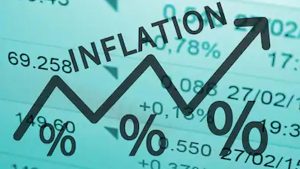By Onome Amuge
Nigeria’s inflation rate rose for the second consecutive month in the year to a new 17-year high of 21.91 per cent in February 2023, from 21.82 per cent recorded in the previous month of January, representing an increase of 0.09 percentage points when compared to January 2023 headline inflation rate.
The National Bureau of Statistics (NBS),made this known in its latest Consumer Price Index (CPI) report which reflected the negative impact of the cash scarcity witnessed across the country during the period in review, inflicted by the naira redesign/cash swap policy and uncertainties surrounding the presidential election
The report, which measured the rate of changes in prices of goods and services, noted that on a year-on-year basis, the headline inflation rate was 6.21 per cent points higher compared to 15.70 per cent recorded in the corresponding period of February 2023.
On a month-on-month basis, the percentage change in the All-Items Index in February 2023 was 1.71 per cent, which was 0.16 percentage points lower than the 1.87 per cent rate recorded in January 2023. This, according to the NBS, means that in February 2023, on average, the general price level was 0.16 per cent lower relative to January 2023.
The report further showed that the percentage change in the average CPI for the twelve months period ending February 2023 over the average of the CPI for the previous twelve months period was 19.87 per cent, indicating a 3.15 percentage points increase compared to 16.73 per cent recorded in February 2022. Similarly,increases were recorded in all COICOP divisions that yielded the headline index.
As a result, the urban inflation rate in February 2023 rose to 22.78 per cent, 6.53 percentage points higher year-on-year, compared to the 16.25 per cent recorded in February 2022.
On a month-on-month basis, the urban inflation rate stood at 1.85 per cent in February 2023, 0.13 percentage points lower compared to 1.98 per cent recorded in January 2023. Meanwhile, the corresponding twelve-months average for the urban inflation rate was 20.45 per cent in February 2023,3.16 percentage points higher compared to the 17.29 per cent recorded in February 2022.
On a similar trend, the rural inflation rate was higher in February at 21.10 per cent, rising 5.92 percentage points on a year-on-year basis,compared to the 15.18 per cent recorded in February 2022. On a month-on-month basis, the rural inflation rate dipped 1.58 per cent, down 0.19 percentage points compared to 1.77 per cent recorded in January 2023. The report also noted that the corresponding twelve-months average for the rural inflation rate in February 2023 was 19.33 per cent, 3.15 percentage points above the 16.18 per cent recorded in February 2022.
The food inflation rate in February 2023 was 24.35 per cent on a year-on-year basis, which was 7.24 percentage points higher compared to the 17.11 per cent recorded in the corresponding period of February 2022.

The “All items less farm produce” or Core inflation, which excludes the prices of volatile agricultural produce stood at 18.84 per cent in February 2023 on a year-on-year basis; up by 4.83 per cent when compared to the 14.01 per cent recorded in February 2022.
According to the statistics bureau, the highest increases were recorded in prices of gas, passenger transport by air, liquid fuel, fuels, and lubricants for personal transport equipment, vehicles spare parts, solid fuel, etc.
The core inflation rate was 1.06 per cent in the month under review. On a month-on-month basis,the figure was down by 0.76 percentage points against 1.82 per cent in January 2023.
Meanwhile, the average twelve-months annual inflation rate was 16.92 per cent for the twelve-months ending February 2023, 3.46 percentage points higher than the 13.46 per cent posted in February 2022.








The art of doing nothing: Nigeria & The World